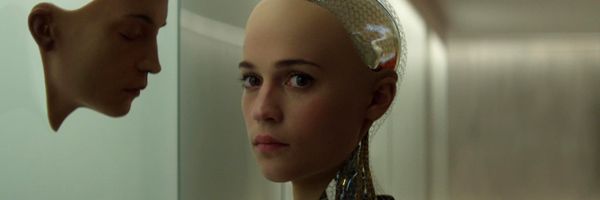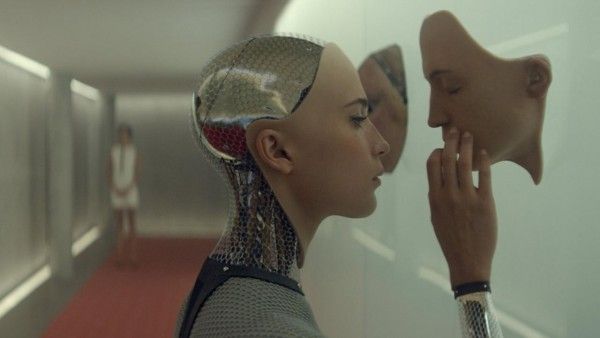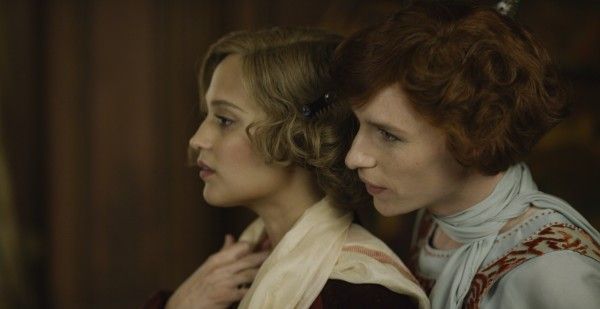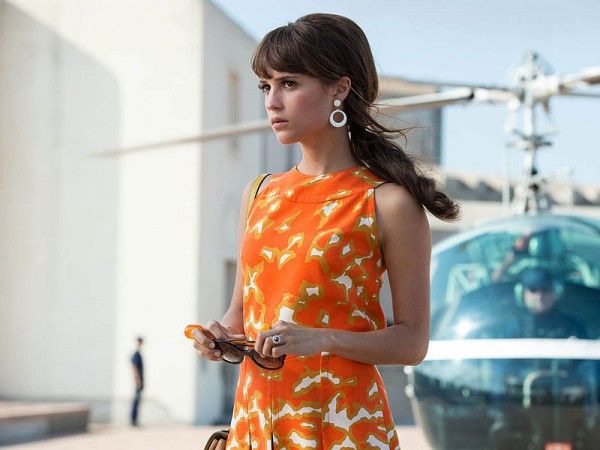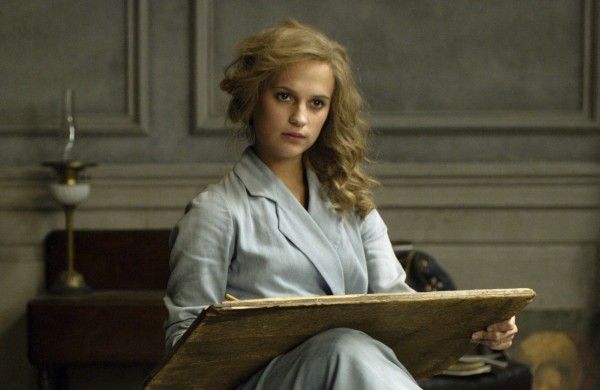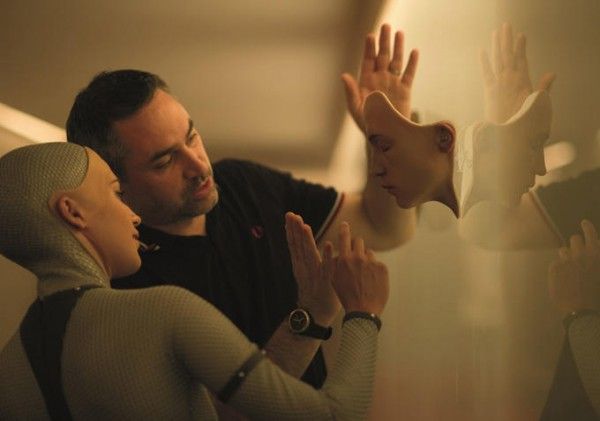The 31st Santa Barbara International Film Festival (SBIFF) continued its tradition of honoring the year’s standout performers by presenting one of this year’s Virtuosos awards to Alicia Vikander for her stand-out work as the A.I. humanoid Ava in Ex Machina and as Gerda Wegener in The Danish Girl. The films are drastically different in their subject matter, but allowed Vikander the opportunity to display a wide range of emotions, both subtle and intense, and everything in between, and left audiences utterly compelled and wanting to see what she does next.
While there, Swedish actress Alicia Vikander talked about the experience of going from watching the Oscars on TV in her native Sweden to being an Actress in a Supporting Role nominee (for The Danish Girl), the discipline she has from her background in dance, how impressed she was with the CGI in Ex Machina, finding Ava’s voice, the shocking ending, Gerda’s range of emotions, the importance of the love story between Gerda and Lili (Eddie Redmayne), her dream project, the icon she’d like to play, and the movie that really stood out for her in 2015. Here are the highlights of what she had to say during the Q&A.
Question: As a child in Sweden, did you watch the Oscars?
ALICIA VIKANDER: Yeah, but it took me a few years to convince my mum that I could get up at 3 am to watch it. It’s actually just a few years back, and it’s a bit of a tradition back home. We met up in the morning and watched it. I even went and had sleep-overs with friends.
How did your background in dance and those years of training help you with Ex Machina and The Danish Girl?
VIKANDER: Even though it was really tough shooting those films, I knew it was never going to be as tough as ballet school. It’s something that I’m extremely proud of, and I’m so happy I had that training. I didn’t go to theater school, so that was my education and foundation for being on stage. Of course, I got physical awareness, I hope, and maybe some self-discipline. I think it’s something I bring unconsciously to most parts. But then, with Ex Machina, when I read the script and did my first self-tape, I did it in the middle of the night. I was in Australia, so I couldn’t meet (writer/director) Alex [Garland], at that point. I stood in front of the mirror in the bathroom and tried to find some physicality for Ava, which I really enjoyed.
In later scenes, in Ex Machina, we do see Ava with hair and with clothes on, but in earlier scenes, she’s much more spare and see-through in several parts of her body. What was it like to see yourself like that? Did you see it in stages, or did you only see it in the finished product?
VIKANDER: First of all, so much credit goes to the people who worked on the CGI on the film. It’s a small indie film and it had a small budget. I heard that half of the budget went to create my tummy. We couldn’t use any green screen because that was too expense, apparently, we made this full Spider-Man suit that I wore, every day, and we put my hair in a bald cap and built my forehead on top of my skull, so that it actually looked like it was on top of my head. And then, they were able to remove and change certain parts of my body. So, I saw a few photos and images that they had. Both Domhnall [Gleeson] and I carried one of those pictures around with us. I didn’t look really cool in the outfit, I must say, so both of us needed to be reminded of what I was going to look like, hopefully, by the end.
Your voice is so cool and unaffected. How did you and Alex Garland, the director, happen upon that voice?
VIKANDER: We didn’t talk about the voice. I was terrified and I asked him thousands of questions, and he was so good at just telling me, “No, I just want you to give it a try.” The voice came out of he and I talking about the need to trust this character and believe in her. Interestingly enough, it was not the female features that could take in the audience. It was her being very doe-like. If she is that innocent, girlish creature, everyone would want to take care of her. That voice came with that thought.
Because you do trust her so much, as the audience, the ending of the movie is so shocking. What was your reaction when you read it?
VIKANDER: I think I had a similar reaction to hopefully the rest of the audience who watched the film. It was such a brilliant script. I don’t think we changed a word. This is it. Everything was on the page. There were not a lot of stage directions. Every thriller aspect was already in the dialogue. When I actually started to do press for it, all of the journalists walking in had very, very different reactions. I hadn’t met a lot of people who had seen the film yet. Some people would come in and high-five, and some people would sit down on the other side of the couch. The brilliant thing about the script and the film was that, depending on if you believe that this thing has a consciousness or not, it becomes a very different ending. If you do believe that she does, it’s suddenly a girl trapped in a room, that is being kept by two other men. I love that people saw it very, very differently.
How did Gerda in The Danish Girl rank in degree of difficulty, in the range of intense emotions that you had to play in one part?
VIKANDER: I find all parts very difficult, in different ways. Ex Machina was difficult because I had to contain. You always want to translate as much emotion as you can, even if it’s broader with bigger emotions. I love that Gerda had such an energy to her. I did explore a big range with her. There’s something about portraying someone that I looked up to for being so incredibly loving and good. A human is all those things, but I always had to question myself, if I would have been able to. It was an interesting thing to try to find a way for a human to really be able to support that much and be that caring.
The focus of The Danish Girl was on this inspirational love story. How did you achieve that throughout filming?
VIKANDER: First of all, I had Eddie [Redmayne] to work with, so it was quite easy. He’s probably the most adorable and gentle man, and also an incredible actor. We chose to focus on it, but it was already there. When I picked up that script, I was just blown away by Lili and what she went through with gender confirmation surgery in the ‘20s. Like you do nowadays, I finished the script and went straight to my computer and just started to Google, and I couldn’t find much information, but I found photos of this couple and read about their journey as artists. Gerda was a woman who was working, 100 years back, and had support from her husband. They did stay together until a year before, sadly enough, Lili passed away, but that was also because the marriage was canceled because she was now a woman.
Do you have a dream project?
VIKANDER: I want to bring Persona, by Ingmar Bergman, to the stage.
What icon would you want to play in a movie?
VIKANDER: I would choose Greta Garbo.
If you had to act in a different language, what language would it be?
VIKANDER: Japanese.
What is one movie that came out in 2015 that you would recommend because it affected you, but you don’t think enough people have discovered it?
VIKANDER: I utterly loved 45 Years. I saw it on a plane and the screen was too small, so I’ve seen it again, up on the big screen. It is utterly worth it.

